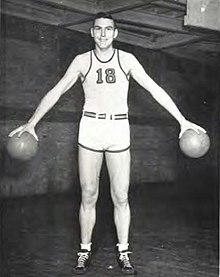 Otten in his senior season at Bowling Green | |
| Personal information | |
|---|---|
| Born | April 18, 1921 Bellefontaine, Ohio, U.S. |
| Died | September 18, 1985 (aged 64) |
| Listed height | 6 ft 10 in (2.08 m) |
| Listed weight | 240 lb (109 kg) |
| Career information | |
| High school | Bellefontaine (Bellefontaine, Ohio) |
| College | Bowling Green (1942–1946) |
| Playing career | 1946–1953 |
| Position | Center |
| Number | 15, 13, 17, 14 |
| Career history | |
| 1946–1950 | Tri-Cities Blackhawks |
| 1950 | Washington Capitols |
| 1950 | Baltimore Bullets |
| 1950–1951 | Fort Wayne Pistons |
| 1951–1953 | Milwaukee Hawks |
| Career highlights and awards | |
| |
| Career NBA statistics | |
| Points | 2,294 (10.5 ppg) |
| Rebounds | 928 (6.0 rpg) |
| Assists | 297 (1.4 apg) |
| Stats at NBA.com | |
| Stats at Basketball Reference | |
Donald Frederick Otten (April 18, 1921 – September 18, 1985) was an American professional basketball player.
A 6'10" center from Bellefontaine High School (Ohio) and Bowling Green State University, Otten began his professional career in 1946 with the Tri-Cities Blackhawks of the National Basketball League. During the 1948–49 NBL season, Otten averaged 14.0 points per game and earned league MVP honors.[1] The Blackhawks joined the National Basketball Association (NBA) in 1949, and Otten continued playing until 1953, competing for Tri-Cities as well as the Washington Capitols, Baltimore Bullets, Fort Wayne Pistons, and Milwaukee Hawks. He averaged 10.5 points per game in his NBA career.[2] Don's brother Mac Otten also played in the NBA. In 1949, Don and Mac became the first ever pair of brothers to play for the same team in the NBA.
Otten is tied with Lew Hitch at first for the NBA record[3] for most personal fouls in a game, with eight. He set the record in a November 24, 1949 game between Tri-Cities and the Sheboygan Red Skins. NBA Rule 3, Section I permits a player to remain in the game after fouling out if no other players are available on the bench.[4]
NBA career statistics
[edit]| GP | Games played | GS | Games started | MPG | Minutes per game |
| FG% | Field goal percentage | 3P% | 3-point field goal percentage | FT% | Free throw percentage |
| RPG | Rebounds per game | APG | Assists per game | SPG | Steals per game |
| BPG | Blocks per game | PPG | Points per game | Bold | Career high |
Regular season
[edit]| Year | Team | GP | MPG | FG% | FT% | RPG | APG | PPG |
|---|---|---|---|---|---|---|---|---|
| 1949–50 | Tri-Cities | 46 | – | .366 | .717 | – | 1.6 | 12.1 |
| 1949–50 | Washington | 18 | – | .391 | .777 | – | 1.0 | 14.9 |
| 1950–51 | Washington | 16 | – | .291 | .796 | 6.6 | 1.4 | 9.3 |
| 1950–51 | Baltimore | 2 | – | .200 | .556 | 1.5 | 1.5 | 5.5 |
| 1950–51 | Fort Wayne | 49 | – | .362 | .811 | 6.0 | 0.8 | 8.4 |
| 1951–52 | Fort Wayne | 7 | 9.0 | .250 | .875 | 2.9 | 0.7 | 3.4 |
| 1951–52 | Milwaukee | 57 | 30.3 | .352 | .769 | 7.3 | 2.1 | 13.0 |
| 1952–53 | Milwaukee | 24 | 16.0 | .391 | .703 | 3.7 | 0.9 | 5.5 |
| Career | 219 | 24.7 | .357 | .761 | 6.0 | 1.4 | 10.5 | |
Playoffs
[edit]| Year | Team | GP | MPG | FG% | FT% | RPG | APG | PPG |
|---|---|---|---|---|---|---|---|---|
| 1950 | Washington | 2 | – | .400 | .808 | – | 3.0 | 20.5 |
| 1951 | Fort Wayne | 3 | – | .308 | .813 | 6.3 | 2.7 | 9.7 |
| Career | 5 | – | .353 | .810 | 6.3 | 2.8 | 14.0 | |
References
[edit]- ^ "Steve Dmitry's NBL Website". Archived from the original on August 18, 2005. Retrieved October 25, 2009.. Retrieved 29 August 2007.
- ^ NBA statistics. Retrieved 29 August 2007.
- ^ "Most Fouls In A Game". StatMuse. Retrieved May 8, 2022.
- ^ "Regular Season Records: Personal Fouls". NBA.com. Archived from the original on March 16, 2017. Retrieved September 14, 2007.